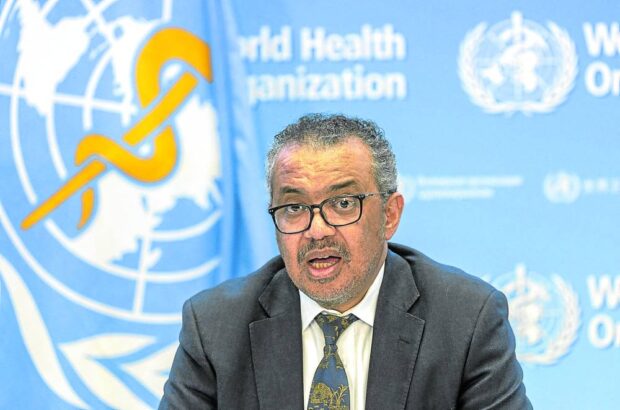
Director-General of the World Health Organisation Dr. Tedros Adhanom Ghebreyesus (Reuters)
LONDON—Covid-19 no longer represents a global health emergency, the World Health Organization (WHO) said on Friday, a major step toward the end of the pandemic that has killed more than 6.9 million people, disrupted the global economy and ravaged communities.
The WHO’s Emergency Committee met on Thursday and recommended the UN-agency declare an end to the public health emergency of international concern, which has been in place for over three years.
“It is therefore with great hope that I declare Covid-19 over as a global health emergency,” said WHO Director General Tedros Adhanom Ghebreyesus, adding the end of the emergency did not mean Covid-19 was over as a global health threat.
The WHO’s emergency committee first declared that Covid-19 represented its highest level of alert more than three years ago, on Jan. 30 2020. The status helps focus international attention on a health threat, as well as bolstering collaboration on vaccines and treatments.
But it’s here to stay
Lifting it is a sign of the progress the world has made in these areas, but Covid-19 is here to stay, the WHO has said, even if it no longer represents an emergency.
“Covid-19 has changed the world, and it has changed us. And that’s the way it should be. If we go back to how things were before Covid-19, we will have failed to learn our lessons, and failed our future generations,” Ghebreyesus said.
The death rate has slowed from a peak of more than 100,000 people per week in January 2021 to just over 3,500 in the week to April 24, according to WHO data.
The WHO does not declare the beginning or end of pandemics, although it did start using the term for Covid-19 in March 2020.Last year, US President Joe Biden said the pandemic was over.
Like a number of other countries, the world’s biggest economy has begun dismantling its domestic state of emergency for Covid-19, meaning it will stop paying for vaccines among other benefits.
Other regions have taken similar steps. The European Union said in April last year the emergency phase of the pandemic was over, and the WHO’s African head, Matshidiso Moeti, said in December it was time to move to routine management of Covid-19 across the continent.
Ending the emergency could mean that international collaboration or funding efforts are also brought to an end or shift in focus, although many have already adapted as the pandemic has receded in different regions.
Ocassional surges
Here is the current state of play for Covid-19, which Ghebreyesus said has now killed at least 20 million people:
After the massive waves of infections that hit countries in the pandemic’s early stages, the number of deaths from Covid-19 has dramatically fallen, largely due to increased immunity from vaccination or previous infection.
COVID-19 deaths have dropped by 95 percent since the start of the year, according to the WHO.
Experts now expect a lower normal level of Covid-19 to be punctuated with seasonal resurgences, similar to influenza.
Toll
More than 765 million Covid-19 infections and nearly 7 million deaths have been officially reported to the WHO since the start of the pandemic.
However, Ghebreyesus said on Friday that at least 20 million people were estimated to have been killed by Covid-19—nearly three times the official number.
To make up for inconsistently collected or incomplete national tolls, researchers have compared the number of excess deaths worldwide since 2020 to the pre-pandemic figures.
For 2020 and 2021, nearly 15 million excess deaths were due to Covid-19, either from the disease itself or indirectly through its impact on society, the WHO has said previously.
Variants
Since the Omicron variant emerged in late 2021, a range of its subvariants have been competing for dominance.
Most recently, the Omicron subvariant XBB.1.16 has been rising in several countries.
Ghebreyesus has said that XBB.1.16’s emergence “illustrates the virus is still changing, and is still capable of causing new waves of disease and death.”
While XBB.1.16 is not thought to be significantly more dangerous than previous strains, experts warn that the virus could yet mutate into deadlier or more transmissible variants.
Vaccines were developed against Covid-19 in record time and have proved a powerful weapon against the virus, with more than 13 billion doses administered worldwide so far.
However, vaccination rates have varied widely between rich and poor countries, sparking calls to address the gap in access.